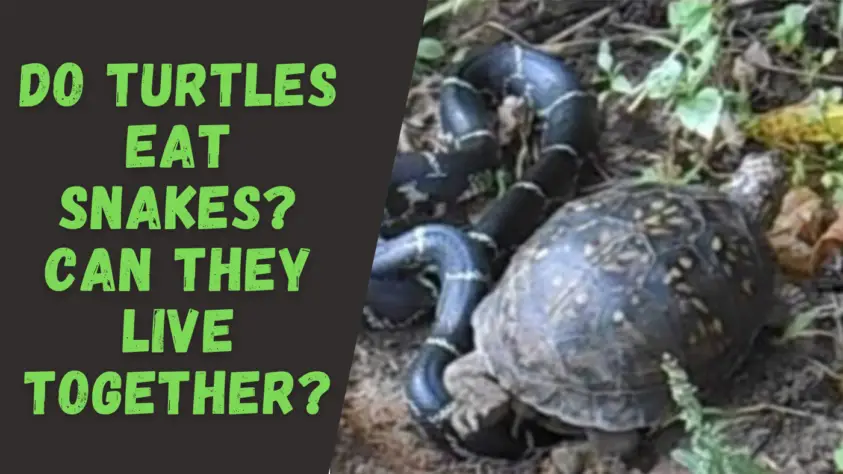Turtles are quickly becoming one of the most popular reptiles kept as pets, and it’s easy to see why. They are ideal because they require less upkeep than dogs or cats and are more interactive than fish.
However, there are many things that a new turtle owner may not be aware of, and it is critical to learn everything you can before purchasing a turtle to ensure that you make no mistakes during this new adventure. Many reptile owners fantasize about keeping different types of reptiles, such as turtles and snakes, together.
While keeping turtles and snakes together may appear to be a good idea at first, this article will teach you why it is not. Along with that, we will also answer the question, “Do turtles eat snakes?” in this article.
Do turtles eat snakes?
While it does not happen often, turtles can and do eat snakes. Snapping turtles are known for eating snakes the most in the wild.
Turtle eating habits
Some turtles are carnivores, while others are strictly herbivores; however, the vast majority of turtle species are omnivores.
Some freshwater turtle species, such as the snapping turtle, have been found to prefer eating meat (even though they are omnivores). There have also been reports of snapping turtles eating small mammals and frogs.
Can you keep a turtle and a snake together?
No, you should not keep a turtle with a snake. This is due to different habitats, diets, and territorial tendencies.
Preferences for Different Habitats
A water-filled aquarium with an efficient water filter and a basking area is required for most turtles. Many turtle species need water and humidity to survive, so their aquariums must be filled with water that is the appropriate temperature for the species. Similarly, turtles in captivity will require a basking area to absorb heat and UV rays, which are essential for their health.
While snakes have similar temperature requirements, they should not be kept near large bodies of water. Most snakes are not able to swim. Additionally, most pet snakes need deep substrate so that they can burrow and dig holes.
Distinct Diets
Turtles and snakes eat very different things. Turtles are primarily omnivores that eat insects, food pellets, vegetables and fruits, feeder fish, and so on. On the other hand, many snakes are carnivores that eat frogs, mice, and rodents. At the same time, their feeding schedules differ.
Newborn snakes eat only twice a week, whereas newborn turtles require constant feeding. A turtle usually only eats one meal per week as it grows older. Larger snakes will need to eat once every two weeks or once every week.
In addition, there have been reports of snakes consuming turtles. Because snakes are known to eat turtle eggs in the wild, keeping a snake and a pregnant turtle in the same tank can be dangerous. Furthermore, many snakes prefer to eat smaller turtles, but some find it too difficult to consume an entire turtle.
Territorial Behaviors
Putting two different reptiles in the same tank is a recipe for disaster. When a snake or turtle encounters another creature in its environment, it tends to become aggressive. In particular, snakes are very aggressive and territorial. In fact, it is suggested that snakes don’t even live with other snakes due to their aggression.
Your snake might get in a fight over hideout spots and basking spots.
Conclusion
In the end, keeping snakes and turtles apart is the best course of action. Snakes like the common kingsnake can harm small turtles and turtle eggs, while turtles like the snapping turtle can harm smaller snakes like water snakes. To keep them both safe, keep them in separate areas that cater to their individual needs and preferences.
Snakes and turtles have different needs and characteristics that can make them incompatible, so keeping them in the same enclosure is not recommended. While it may appear to be a good idea, it is not. We hope this article has helped you learn more about keeping reptiles such as turtles and snakes and that it has answered the question, “Do turtles eat snakes?”

